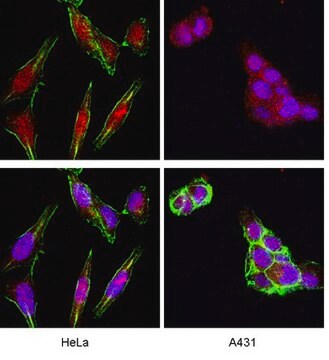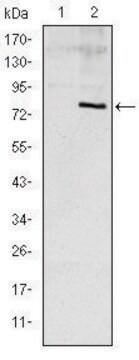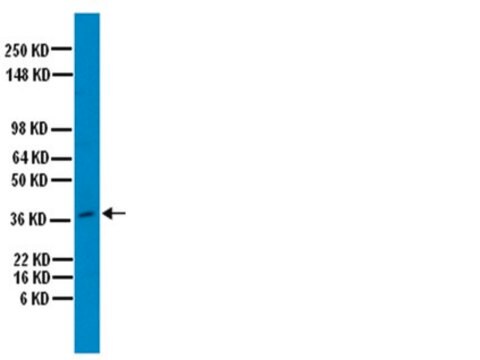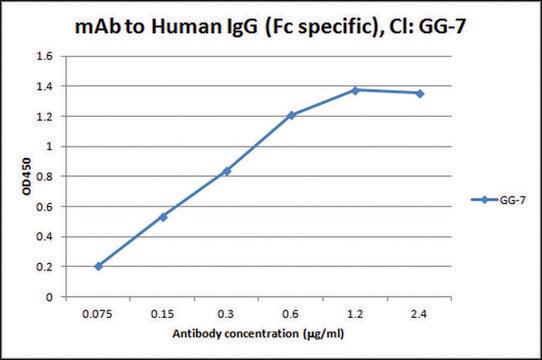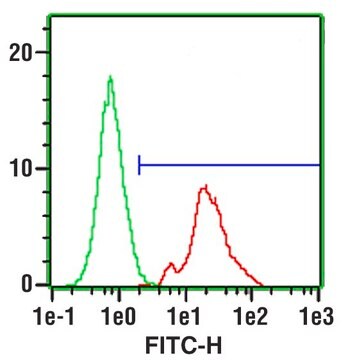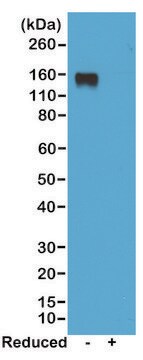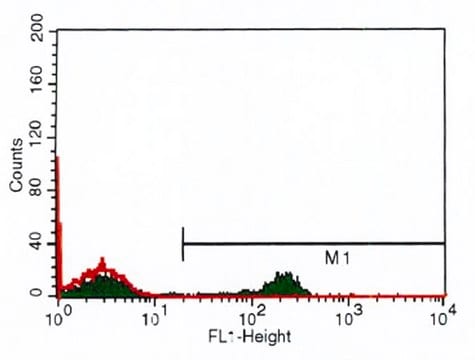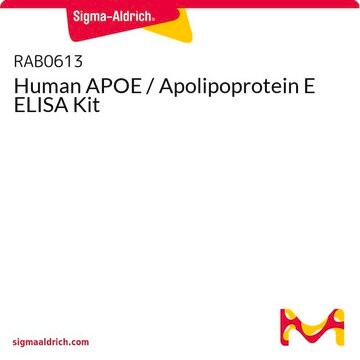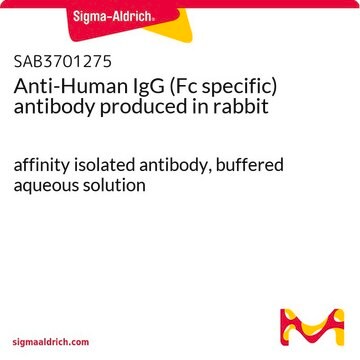おすすめの製品
由来生物
goat
品質水準
抗体製品の状態
serum
抗体製品タイプ
primary antibodies
クローン
polyclonal
フォーム
liquid
含みます
≤0.1% sodium azide as preservative
化学種の反応性
human, rat, mouse
メーカー/製品名
Calbiochem®
保管条件
OK to freeze
avoid repeated freeze/thaw cycles
アイソタイプ
IgG
輸送温度
wet ice
保管温度
−20°C
ターゲットの翻訳後修飾
unmodified
詳細
Anti-Apolipoprotein E, goat polyclonal, recognizes human apolipoprotein E. Does not cross-react with other apolipoproteins. It is validated for ELISA, immunoprecipitation, and free-floating sections.
Goat polyclonal antibody supplied as serum that has been defibrinated, delipidized and dialyzed against a Tris-HCl buffer. Recognizes the apolipoprotein E protein.
Recognizes human apolipoprotein E. Does not cross-react with other apolipoproteins.Antibody Target Gene Symbol: APOE Target Synonym: AD2, AI255918, APOE2, APOE4, APOEA, APOLIPOPROTEIN E, LDLCQ5, LPG, MGC1571 Entrez Gene Name: apolipoprotein E Hu Entrez ID: 348 (Related Antibodies: NE1004) Mu Entrez ID: 11816 Rat Entrez ID: 25728
免疫原
Human
purified recombinant human apolipoprotein E
アプリケーション
ELISA (1:8000)
Immunoprecipitation (see comments)
Free Floating Sections (see application references)
Immunoprecipitation (see comments)
Free Floating Sections (see application references)
包装
Please refer to vial label for lot-specific concentration.
警告
Toxicity: Standard Handling (A)
物理的形状
In 500 mM NaCl, 50 mM Tris-HCl, pH 7.5.
再構成
Following initial thaw, aliquot and freeze (-20°C).
その他情報
Monospecific as determined by immunoelectrophoresis (IEP) against twice concentrated pooled human serum. This antibody has also been reported to work with immunoprecipitation. Variables associated with assay conditions will dictate the proper working dilution.
法的情報
CALBIOCHEM is a registered trademark of Merck KGaA, Darmstadt, Germany
適切な製品が見つかりませんか。
製品選択ツール.をお試しください
保管分類コード
10 - Combustible liquids
WGK
WGK 1
引火点(°F)
Not applicable
引火点(℃)
Not applicable
適用法令
試験研究用途を考慮した関連法令を主に挙げております。化学物質以外については、一部の情報のみ提供しています。 製品を安全かつ合法的に使用することは、使用者の義務です。最新情報により修正される場合があります。WEBの反映には時間を要することがあるため、適宜SDSをご参照ください。
Jan Code
178479-UL:
178479-5ML:
178479-500UL:
178479-0ML:
試験成績書(COA)
製品のロット番号・バッチ番号を入力して、試験成績書(COA) を検索できます。ロット番号・バッチ番号は、製品ラベルに「Lot」または「Batch」に続いて記載されています。
Jin-Dong Ding et al.
Proceedings of the National Academy of Sciences of the United States of America, 108(28), E279-E287 (2011-06-22)
Age-related macular degeneration (AMD) is a leading cause of visual dysfunction worldwide. Amyloid β (Aβ) peptides, Aβ1-40 (Aβ40) and Aβ1-42 (Aβ42), have been implicated previously in the AMD disease process. Consistent with a pathogenic role for Aβ, we show here
Emilie L Castranio et al.
Neurobiology of disease, 105, 1-14 (2017-05-16)
Traumatic brain injury (TBI) is strongly linked to an increased risk of developing dementia, including chronic traumatic encephalopathy and possibly Alzheimer's disease (AD). APOEε4 allele of human Apolipoprotein E (APOE) gene is the major genetic risk factor for late onset
Xiao-Juan Cheng et al.
PloS one, 10(6), e0130432-e0130432 (2015-06-16)
Recent studies suggest that high-salt diet is associated with cognitive decline in human and mouse. The fact that genetic factors account for less than 50% cases of sporadic Alzheimer's disease (AD) highlights the important contribution of environmental factors, such as
Elizabeth S Chan et al.
Scientific reports, 6, 26119-26119 (2016-05-18)
The apolipoprotein E4 (ApoE4) is the strongest genetic risk factor for Alzheimer's disease (AD). The AD brain was shown to be insulin resistant at end stage, but the interplay between insulin signaling, ApoE4 and Aβ across time, and their involvement
Daniel Da Costa et al.
Journal of virology, 86(21), 11919-11925 (2012-08-17)
Hepatitis C virus (HCV) is a human hepatotropic virus, but the relevant host factors restricting HCV infection to hepatocytes are only partially understood. We demonstrate that exogenous expression of defined host factors reconstituted the entire HCV life cycle in human
ライフサイエンス、有機合成、材料科学、クロマトグラフィー、分析など、あらゆる分野の研究に経験のあるメンバーがおります。.
製品に関するお問い合わせはこちら(テクニカルサービス)
